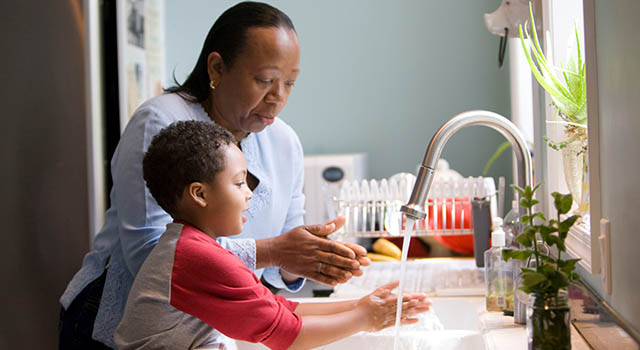As coronavirus (COVID-19) spreads around the world, health professionals are demanding that people limit their personal risk of contracting the virus by thoroughly washing their hands, practicing social distancing, and not touching their nose, mouth, or eyes. In fact, it may surprise you to learn that the eyes play an important role in spreading COVID-19.
Coronavirus is transmitted from person to person through droplets that an infected person sneezes or coughs out. These droplets can easily enter your body through the mucous membranes on the face, such as your nose, mouth, and yes — your eyes.
But First, What Is Coronavirus?
Coronavirus, also known as COVID-19, causes mild to severe respiratory illness associated with fever, coughing, and shortness of breath. Symptoms typically appear within 2 weeks of exposure. Those with acute cases of the virus can develop pneumonia and other life-threatening complications.
Here's what you should know:
Guard Your Eyes Against COVID-19
- Avoid rubbing your eyes. Although we all engage in this very normal habit, try to fight the urge to touch your eyes. If you absolutely must, first wash your hands with soap and water for at least 20 seconds.
- Tears carry the virus. Touching tears or a surface where tears have fallen can spread coronavirus. Make sure to wash your hands after touching your eyes and throughout the day as well.
- Disinfect surfaces. You can catch COVID-19 by touching an object or surface that has the virus on it, such as a door knob, and then touching your eyes.
Coronavirus and Pink Eye
Pink eye, or conjunctivitis, refers to an inflammation of the membrane covering the front of the eyeball. Conjunctivitis is characterized by red, watery, and itchy eyes. Viral conjunctivitis is highly contagious and can be spread by coughing and sneezing, too.
According to a recent study in China, viral conjunctivitis may be a symptom of COVID-19. The study found conjunctival congestion in 9 of the 1,099 patients (0.8%) who were confirmed to have coronavirus.
If you suspect you have pink eye, call your eye doctor in Lincoln right away. Given the current coronavirus crisis, we ask patients to call prior to presenting themselves at the office of Dr. Nicholas Feucht, as it will allow the staff to assess your condition and adequately prepare for your visit.
Contact Lenses or Eyeglasses?
Many people who wear contact lenses are thinking about switching to eyeglasses for the time being to lower the threat of being infected with coronavirus.
Wearing glasses may provide an extra layer of protection if someone coughs on you; hopefully that infected droplet will hit the lens and not your eye. However, one must still be cautious, as the virus can reach the eyes from the exposed sides, tops and bottoms around your frames. Unlike specialized safety goggles, glasses are not considered a safe way to prevent coronavirus.
Contact Lenses and COVID-19
If you wear contacts, make sure to properly wash your hands prior to removing or inserting them. Consider ordering a 3 to 6 month supply of contact lenses and solution; some opticals provide home delivery of contact lenses and solutions. At this stage there is no recommendation to wear daily lenses over monthlies.
Don't switch your contact lens brand or solution, unless approved by your optometrist or optician.
Regularly Disinfect Glasses
Some viruses such as coronavirus, can remain on hard surfaces from several hours to days. This can then be transmitted to the wearer's fingers and face. People who wear reading glasses for presbyopia should be even more careful, because they usually need to handle their glasses more often throughout the day, and older individuals tend to be more vulnerable to COVID-19 complications. Gently wash the lenses and frames with warm water and soap, and dry your eyeglasses using a microfiber cloth.
Stock up on Eye Medicine
It's a good idea to stock up on important medications, including eye meds, in order to get by in case you need to be quarantined or if supplies run short. This may not be possible for everyone due to insurance limitations. If you cannot stock up, make sure to request a refill as soon as you're due and never wait until the last minute to contact your pharmacy.
It is important that you continue to follow your doctor’s instructions for all medications.
Digital Devices and Eyestrain
At times like this, people tend to use digital devices more than usual. Take note of tiredness, sore eyes, blurry vision, double vision or headaches, which are symptoms of computer vision syndrome if they are exacerbated by extensive use of digital devices, and might indicate a need for a new prescription in the near future. This usually isn't urgent, but if you're unsure, you can call our eye doctor's office.
Children and Digital Devices
During this time your children may end up watching TV and using computers, tablets and smartphones more frequently and for more extended periods too. Computer vision syndrome, mentioned above, can affect children as well. We recommend limiting screen time to a maximum of 2 hours per day for children, though it's understandably difficult to control under the circumstances.
Try to get your child to take a 10 to 15 minute break every hour, and stop all screen time for at least 60 minutes before sleep.
Children and Outdoor Play
Please follow local guidelines and instructions regarding outdoor activities for your children. If possible, it's actually good for visual development to spend 1-2 hours a day outside.
From all of us at Eyes on Lincoln in Lincoln, we wish you good health and please stay safe.



Note: Saturday by appointment only